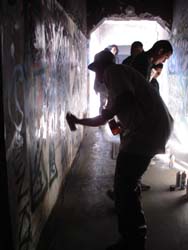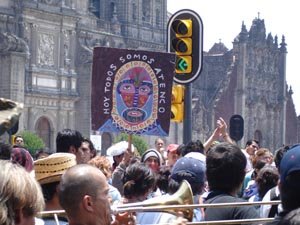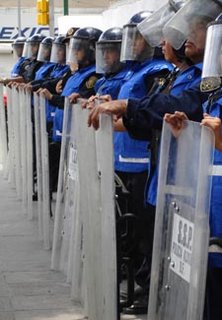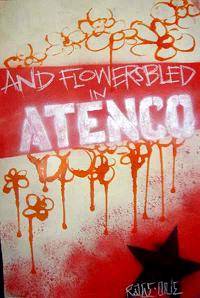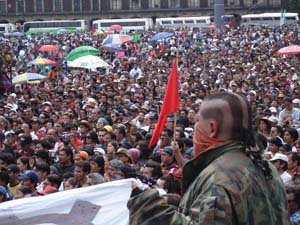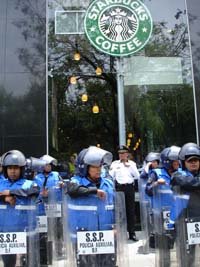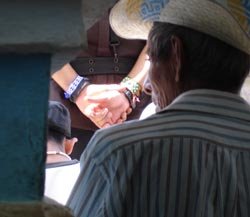July 26, 2006
Communiqué from the Intergalactic Commission of the EZLN
translation El Kilombo Intergaláctico
ZAPATISTA ARMY FOR NATIONAL LIBERATION
MEXICO
July of 2006
Compañeros and compañeras adherents of the Zezta Internazional,
Brother and Sisters of Planet Earth:
This is Insurgent Lieutenant Colonel Moisés writing to share with you the results of more than seven months of Consultation on the next Intergalactic Encounter. As we said in our November 2005 communiqué, the objective, the idea that is, of the intergalactic is that it is really up to all of you to determine how we organize this Encounter.
We truly want all adherents to participate in its organization, that the Intergalactic not be a decision of the EZLN. In the seven months of consultation that have passed since December 1st, 2005, there have been preparatory meetings in different countries, as well as cybernetic consultations. From these meetings we have received proposals for the Intercontinental, on themes to be discussed as well as the date and place for the Encounter.
Like we said above, here we want to report on how the consultations have gone up until now, and the proposals and discussions that have come up. You should let us know if we are missing something and what it is that we are missing. We will be here working, and pending your input.
For our part, our opinion is that we continue with more discussion and more proposals. We think it is necessary to continue thinking and accumulating ideas before coming together in the Encounter, seeing as it’s a fact that we’re going to have the Intergalactic, and that it will belong to all of us that create it.
The report that we have made for you in order to continue the discussion is the following.
Summary of the adherents and the international consultation for the organization of the Intergalactic Encounter:
I. Adherents: The total number of adherents to the Zezta Internazional registered on the webpage from December 1st, 2005 through July 25, 2006 is the following:
Total adherents in the world: 2,173 from 61 countries on 5 continents
By continent:
America: 1,301 adherents from 23 countries
Europe: 848 adherents from 25 countries
Asia: 8 adherents from 6 countries
Oceana: 10 adherents de 2 countries
Africa: 6 adherents from 5 countries
The countries in which there are adherents are the following:
America: Argentina, Belize, Bolivia, Brazil, Canada, Chile, Colombia, Costa Rica, Cuba, Ecuador, El Salvador, United States, Guatemala, Honduras, Martinique, Guatemala, Nicaragua, Panama, Paraguay, Peru, Puerto Rico, Uruguay, and Venezuela
Europe: Germany, Andorra, Austria, Belgium, Croatia, Denmark, the Spanish State, Russian Federation, Finland, France, Greece, Iceland, Ireland, Italy, Norway, Basque Country, Netherlands, Poland, Portugal, United Kingdom, Czech Republic, Serbia and Montenegro, Sweden, Switzerland, and Turkey.
Asia: China, India, Japan, Palestine, Israel, y Uzbekistan.
Oceana: Australia and New Zealand
Africa: Mali, Senegal, Nigeria, Sierra Leon y Morocco
Information on the adherents in each country can be found on the Zezta Internazional webpage.
II. Proposals for place, date, and themes to be discussed
1. Place
We have received the following proposals for where to hold the next Intergalactic Encounter. We should mention that while some of the places were repeated in various proposals, we only list them here once each.
a) One of the Caracoles in Zapatista territory. Chiapas, México
b) San Cristóbal de las Casas. Chiapas, México
c) Cancún, México
d) Teotihuacan, México
e) In a border zone between Mexico and the United States
f) Quito, Ecuador
g) Bolivia
h) Miami, United States
i) New York, Estados Unidos
j) Venezuela
k) Barcelona
2. Dates
The proposals for dates on which the Encounter would be held that have thus far been sent to the Zezta Internazional webpage are the following:
a) Summer of 2006
b) Fall of 2006
c) December of 2006
d) January of 2007
3. Themes to be discussed
This list of proposed themes to be discussed in the next Intergalactic Encounter is long. The proposals came from many parts of the world, and we have here systematized them, for the purpose of this report, in the following manner:
1. Strategies of struggle against transnational industries that plunder and exploit the environment of poor countries.
2. Young people and their issues/problems.
3. International solidarity, what is it and what could it be?
4. The experiences of successful struggles in each country, so that at the end of the Encounter everyone returns to their home with a report on possible actions that have worked in other places.
5. Debate on the necessity of constructing a space of articulation, that would not be yet another electoral referent, but rather the development of a strategy for the accumulation of conscientious social force that would be a tool for those from below.
6. Reflection on the Sixth Declaration of the Lacondón Jungle and the possibility of contributing to it.
7. Neoliberalism and energy policies (struggles related to oil, gas, electricity, against privatization, for example).
8. Water and neoliberalism (struggles related to potable water access, against water privatization, for example).
9. The closing of unprofitable companies (the occupying of factories that were closed by their owners because they were “unprofitable,” and the formation of production cooperatives).
10. Gender and sexual orientation (struggles related to gender equality, the human rights of women, gay and lesbian people, and sex workers).
11. Protection of nature and the environment (struggles against the contamination of rivers, the cutting down of trees by large consortiums, struggles against the “double edge” of so-called “sustainable development,” the appropriation of “biodiversity” by transnational companies).
12. Organizational models and grassroots democracy
13. Democratization of knowledge and of information (struggles against the power of the media consortiums, for the horizontal circulation of information, the creation of alternative media, people’s universities, etc.)
14. Struggles against police and military repression. Debate on “security” as a repressive concept...what type of security do we want?
15. Global autonomous direct actions, and circuits of global autonomous cooperation
16. The struggle against capitalist globalization
17. How to support each other across international borders
18. Actions for the improvement of our communities through sustainable development
19. The creation of open networks against the system
20. The Free Trade Treaties and the unification of Latin America
III. Proposals for the preliminary organization of the Intergalactic Encounter
a) That there be more than one Intergalactic Encounter
b) That the Intergalactic Encounter be an collection of Encounters all over the world
c) That there be preliminary encounters at country and continental levels
d) That an internet chat be opened so that those who cannot attend can participate in the dialogue through cyber-tables with moderators
e) That the Encounter be named after Comandanta Ramona
IV. On the Participants in the Intergalactic Encounter
a) That the participation of those from below be promoted
b) That economic support networks be formed so that people from movements from below (principally in America, Asia, and Africa) that do not have resources can attend
c) That the political parties in Latin America that be convoked
Que se convoque a los partidos políticos de América Latina que reivindican el socialismo.
d) That participative priority be given to indigenous peoples
e) That young people’s movements and networks be taken into account
V. Proposals by Country or Continent
1. Hold various European encounters during the summer of 2006.
2. Interchange of experiences between women of Bolivia with compañeras of the EZLN.
3. Organize meetings of commissions to prepare proposals on a regional level throughout the American Continent
4. Hold an encounter in Costa Rica to discuss an ideology of “below and to the left”
5. Proposal for meetings in Chicago
6. Proposal to create an email list of Chilean adherents of the Zezta that want to participate in the discussion and diffusion of the Sixth Declaration of the Lacondón Jungle
VI. On Activities and Meetings preliminary to the Intergalactic
Although the EZLN communiqué on the Intergalactic came out in November of 2005, international activities were going on as of July of the same year, just days after the publication of the Sixth Declaration of the Lacondón Jungle.
From July 2005 through July 2006, 19 preliminary activities to the Intergalactic Encounter have been registered, in 16 cities in 9 countries around the world. Of those 9 countries, 6 are in the Americas and 3 in Europe.
The encounters were held in Barcelona, the Spanish State (July 2005); Bisegna, Italy (September 2005); Buenos Aires, Argentina (December de 2005); Germany (January 2006); Madrid, the Spanish State (February 2006); Buenos Aires, Argentina (February 2006); Barcelona, Spanish State (February 2006); Vancouver, Canada (February 2006); Paraná, Argentina (February 2006); San Salvador, El Salvador (February-March 2006); Los Angeles, United States (March 2006); Cosenza, Italy (March 2006); Chicago, United States (March 2006); Paraná, Argentina (April 2006); Rosario, Argentina (April 2006); La Garriga, Spanish State (May 2006); Brasilia, Brazil (June 2006); Montevideo, Uruguay (June 2006).
Reports from each of these activities can be found on the Zezta Internazional webpage.
Important note: There are surely omissions in this and previous lists. We apologize for this and we invite you to send information about any encounters, proposals, and adherents not here reported.
Compañeros y compañeras,
This is the report that we wanted to present to you on the Consultation that has been held over these months. The Intergalactic Commission of the EZLN, through the Zezta Internazional webpage and the listserves of adherents, will continue informing you about the proposals that we receive, until there is an idea of what it is that we want and how we are going to do it.
Keep working compañeros y compañeros! Let your voice be heard, don’t let it be left out of the next Intergalactic Encounter!
We also want to comment, brothers and sisters, that we are aware of all the actions that have been organized internationally to demand the liberation of our brothers and sisters of Atenco. You have held 209 mobilizations in 77 cities in 30 countries around the world. All have been good, but of course we say we must keep mobilizing because our compañer@s are still being held unjustly in prison, while those responsible for the repression are free in the streets.
What’s more, this is not the only injustice. We know that there are many more injustices in the world, like that suffered by our compañer@s farmers of South Central Farm in Los Angeles, who were evicted from their land where they lived and worked collectively. We have to support these brother and sisters so that they continue their struggle and do not give up.
There is also the injustice of the imprisonment of our Mapuche brothers and sisters in Chile. We have to tell them that we keep them present in our minds and hearts, that we know that how the bad government of Chile is, that it doesn’t think about the poor people from below, but rather is only interested in those of above, as usual.
We have to get used to struggling and we have to get used to organizing ourselves better. We have to accustom ourselves to seeing those from below and to struggling for what is a true LIBERTY, DEMOCRACY, AND JUSTICE.
The hour is upon us, it's time.
Onward compañer@s!
From the mountains of the Lacondón Jungle
Insurgent Lieutenant Colonel Moisés
Intergalactic Commission of the EZLN
